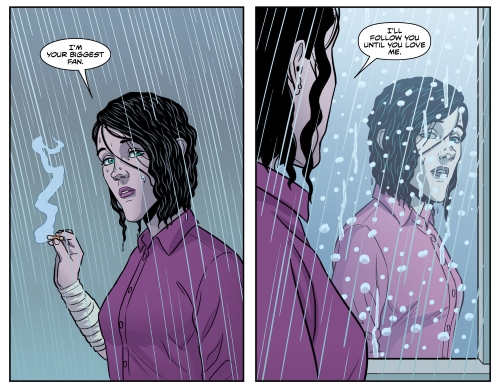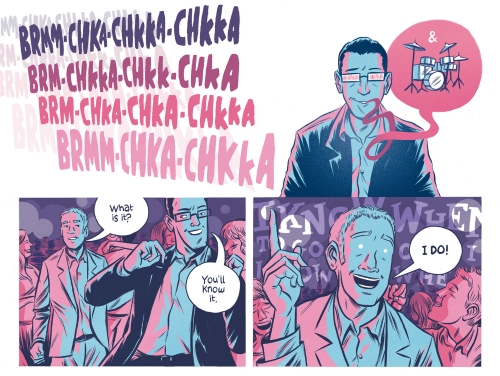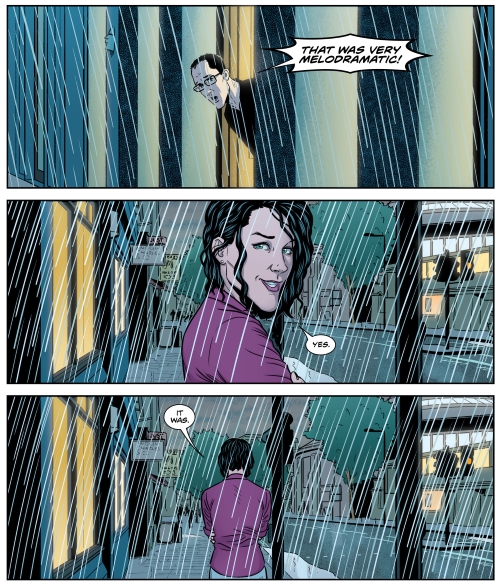
I come to praise Phonogram, not to bury it. But first, something important needs to be stated: in the end, it really was too powerful to live.
I moved to London in August 2006. The first issue of Phonogram was released in August 2006.1
Of course, the last post in this series was rather extensively about Phonogram’s personal impact on me, so I don’t want to get into it too much again, but one more time for the cheap seats. This comic has made me friends, brought me a little closer to an industry I love, helped me to rediscover the power that music can have, gently furthered my career as a writer; and while it was sort of indirect, it was basically responsible for the evening last year on which I hosted a launch night Q&A in a comic shop.2
The final issue of Phonogram was released in January 2016. It’s not quite the same month I’m leaving London – that’s not happening for a couple more months – but at least they managed to (just) get the year right.
2006-2016. Ten years of synchronicity, coincidence, and poetry.

I’ve been in denial about the end of Phonogram for some time. And reading The Immaterial Girl as it’s come out, while it’s had some pretty great moments (especially that Scott Pilgrim Lloyd issue, which struck at my brain and chimed like the most tuneful glockenspiel in the world, as anyone who knows anything about me would expect) there was little about it that felt like it needed to be the last run. Surely there was still plenty of life in the concept, the characters, the world that Gillen and McKelvie had built?
Well, perhaps there still is; perhaps there are countless untold Phono-stories in Gillen’s brain, or perhaps one day the doors will be opened for someone else to play with the concept using different characters. But with the final issue, The Immaterial Girl makes clear exactly why it’s the ending that it is; why a comic that’s about pop music and magic could only ever really have reached its conclusion in 2009, with the death of Michael Jackson. We all just have to sit here ashamed that we didn’t manage to work out that that’s where it was going until it got there.
Except it turns out that it still needed to have a postscript, because it was published ten days after the death of David Bowie, and one of its backup strips features “Modern Love”. I mean, come on. If this is what Phonogram is capable of, it’s no wonder it had to end now. Otherwise we’re none of us safe.

Part of the game we played with this series was in allowing Kieron to pretend that David Kohl wasn’t entirely him; that there was some element of fiction in there. And there probably was, but the backup strips in Immaterial Girl always felt even more like the author speaking directly than any of the rest of the book had previously done. So the final page of the backup strip here shouldn’t feel like too much of a surprise. But it does. Call it going Duck Amuck or going Grant Morrison Animal Man or even going Fraction/Zdarsky if you like; but really, all it is is a final indulgence, an admission, a shared, knowing wink. “Yeah, alright. You got me.”
And in a way, it also betrays why the series needed to end now. Because Phonogram was always about the relationship between artists and fans, told from the perspective of fans. Of course, those lines always got blurred from time to time, but it’s harder to argue that the Phonogram of 2016 is looking in at art and culture from the outside in the same way as the Phonogram of 2006 was. Gillen and McKelvie are, themselves, artists of repute. That’s why they’re doing The Wicked + The Divine, a series about actually being an artist that has ironically (or not so ironically, really) made them more well-known and successful than they’ve ever been. They’re not really plucky outsiders any more (at least not in this field), and that’s absolutely okay; but it means that almost everything they do in it comes from a completely different perspective.3
In short, any new Phonogram created from here on out would sort of have to be about the winners, rather than the losers.

Of course, Phonogram didn’t actually kill David Bowie. It doesn’t really have that kind of power.4 It’s got an innate sense of coincidence, but even that is often the sort of coincidence that you blurrily create in your head, slightly conflating events or confusing dates (we come back to “print the legend”). Stuff retrospectively fits together and makes sense, more than it seemed to at the time. It’s just that that final issue managed to be a bit more immediate with it all.
But it is sort of… if not good that it’s ending now, then apt, at least. Necessary, even. It would be far too easy to keep wanting new Phonogram, feeding on the emotions and nostalgia that it provides, allowing it to encourage (indulge, even) that part of the brain that likes to wallow in pretension and melodrama. I’ve been part of what one could charitably describe as its hardcore fanbase (and less charitably as… well, all sorts of things) for basically all of that decade, writing multiple thousands of words about it, contributing to the fanzine, showing up to pretty much every thinly-veiled excuse for a party, and always feeling slightly disgruntled that there wasn’t quite room to get me me a pull quote on the Singles Club trade. But tying all of that off after ten years, that feels nice and round, and clean. Certainly cleaner and simpler than anything else the book ever did.
There’s just time for one more Phono-party before I blow this town. I imagine we’ll say goodbye to it the best and only way we know how.

2006-2016.
Leave a Reply